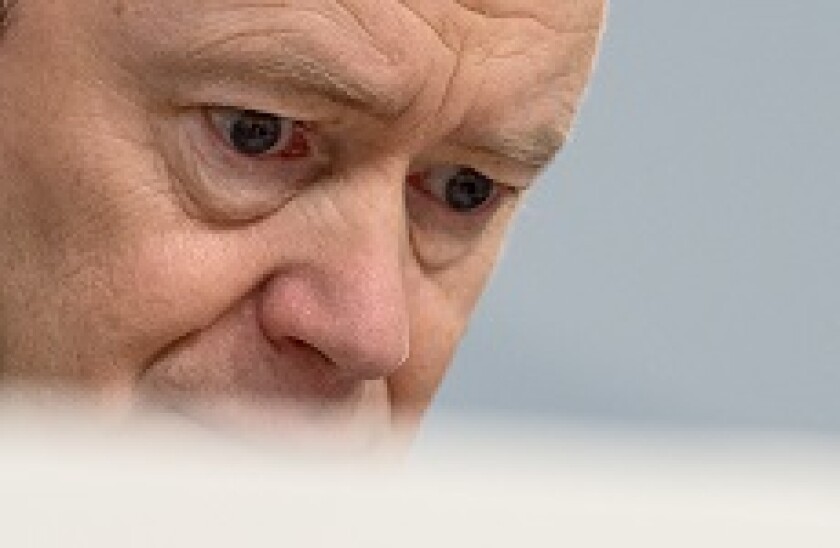John Cryan, Deutsche’s chief executive, has been pretty insistent that the firm can squeak through without a capital increase. He took over as boss in 2015, when the bank was still fresh from 2014’s €8bn Qatar-supported rights issue and AT1 double-whammy. Investors wanted reassurance that there would be no more cash calls and the bank would knuckle down and start earning.
But this reassurance never quite came. Deutsche’s business was buffeted by two market panics in 2016, the first about its ability to pay coupons on subordinated debt, the second by the magnitude of its potential settlement with the US Department of Justice in September, and in both cases, investors and clients worried about capital strength — and some left the bank behind entirely.
Both of these proximate causes are now solved. Deutsche has settled its RMBS case, while tweaks to European rules have reassured investors that their AT1 coupons won’t be stopped. But that doesn’t mean Deutsche has enough capital to prevent the next market panic. Concerns about the bank’s solvency need to be put to rest.
So here the bank is, with a new €8bn rights issue, underwritten by Credit Suisse, Barclays, Goldman Sachs, BNP Paribas, Commerzbank, HSBC, Morgan Stanley and UniCredit.
It’s a good time to be raising capital — bank stocks have been flying since Donald Trump became US president thanks to whispers about deregulation and settlement of the RMBS case. The issue should close on April 6, ahead of any potential electoral upsets in Europe too.
It brings Deutsche to a chunky 14.1% CET1 ratio, though, given the bank’s proficiency at RWA management, perhaps the 4.1% leverage ratio is a more useful metric.
The bank’s managing directors, anyway, will be watching closely. Though the bank took an axe to the bonus pool this year, certain key senior staff have been generously rewarded with a form of option, geared up to pay out if the bank’s shares are over €22 in three years time.
Monday morning saw Deutsche open more than 6% down (8% down from Friday afternoon, when the first rumblings of the issue hit the newswires) — but that only erases a week of gains, returning the stock to the miserable levels of the last Friday in February.
Yet more capital will come in through a minority stake sale in Deutsche Asset Management (just as Credit Suisse starts to hint that, perhaps, selling off a chunk of one’s best assets is not the best way to raise funds).
The nagging question, though, is still whether all this new capital will give the business new purpose and direction.
Early hints are not particularly inspiring. Deutsche wants a more “corporate-client” focused investment bank. Markets will cease to exist as a separate unit, and the institutional client list will become more “focused”. Capital will be redeployed from markets to corporate finance, and €20bn of legacy assets will be taken out of markets to be managed separately.
These assets aren’t moving to the non-core division though — Deutsche closed that at the end of 2016, right on schedule.
The bank was clear that it was maintaining its geographic presence in the US and Asia. But it’s hard to see what exactly makes Deutsche special in its new shape. Every bank has retooled towards corporate finance and away from parts of FICC, trimmed client lists and cut costs. Some banks did that half a decade ago, and are now in a position to either splash the cash on winning new business, or give it back to shareholders.
Cryan at the bank’s fourth quarter results suggested credit and solutions would be the part of markets to do best, with FX and rates increasingly commoditised and under margin pressure. That makes sense, if the bank now wants to focus on corporate finance business more, but again, it’s not particularly distinctive — that’s pretty much how Credit Suisse has been reshaping its market business, and, again, all banks these days are now anxious to point out how much time their credit traders spend working on corporate solutions business rather than running their own big positions.
Jeff Urwin’s retirement, though previously reported, can hardly be seen as a stunning endorsement of Deutsche’s approach. Urwin was one of the last big hires of the Anshu Jain era, starting work just after Jain resigned, and was handed considerable responsibility, running the CIB division (corporate finance and transaction banking) and the US business.
But it seems inconceivable that Urwin made the jump from JP Morgan, where he was co-head of investment banking, with the aim of retiring in two years. Nothing about running corporate finance at an embattled institution like Deutsche says “retirement trade”, though curiously, Deutsche said he would still be involved in US regulation for Deutsche following retirement.
More cost, too, is coming out of the business — €700m extra off the combined corporate finance, markets and transaction banking division. Deutsche hasn’t broken this down any further, but it’s a fair guess this will mostly come out of markets — the tone was far friendlier when discussing corporate finance (which is getting more capital) and transaction banking then when talking trading.

